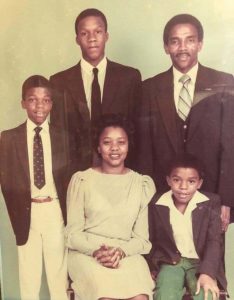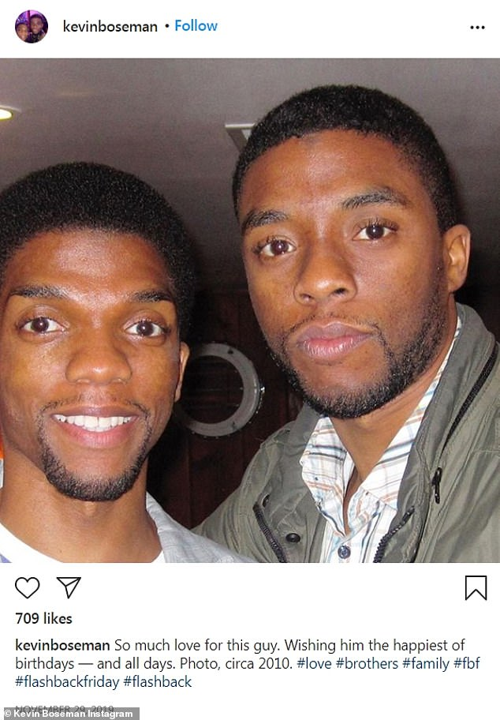
When Chadwick Boseman died at 43, two years shy of the recommended colon screening age, Black doctors had hoped it would lead more Black men to get screened for colon cancer.
Doctors say more Black men have gotten screened since the “Black Panther” star’s death; however, there is no quantifiable data for overall screenings of Black men.
Although Boseman’s death shed light on the disease and the need to lower the screening age, which was previously 50, Black people are still 20% more likely to get colon cancer and 40% more likely to die from it, the American Cancer Society notes.
“Most people, when they think of colon cancer, think of someone being old,” Dr. Saundra Dalton-Smith, an internal medicine physician in Alabama, tells NBC. “You don’t think of someone who was in their early 40s, like Chadwick, definitely not someone who looked as healthy as he did. So, I think it really helps people to wake up to just how easy it is for this particular cancer to be active and do harm in your body without you being aware of it.”
How Chadwick Boseman Changed the Landscape for Black Men
Additionally, Blacks are more likely to have advanced colon cancer, making their life span shorter when diagnosed. These numbers are concerning when you think about the fact that colon cancer is treatable when it is found early.
High rates of colon cancer in the Black community are directly linked to lower rates of screening, structural racism, social determinants of health, and difficulty obtaining available treatment, reports show.
Boseman’s death raised awareness in the Black community of the symptoms they should look out for; however, the pandemic caused lower screening numbers. Aside from that, there is a perception that colon cancer screenings are invasive, which deters many Blacks from getting them.
“Chadwick Boseman had this national profile. He was the Black Panther. He obviously raised awareness, but a lot of times in our community, we don’t want to get the screening because we start thinking about the whole invasiveness part of it when it doesn’t even have to be that,” Dr. Dalton-Smith shares with NBC.
Chadwick Boseman’s Brother Suffered from Cancer, Too!
Cancer was something that Boseman’s brother dealt with as well. At the end of last year, his brother Kevin Boseman revealed he’s in remission following his own battle with cancer.
In a series of posts on his Instagram story, Kevin announced he’s officially been cancer-free for two years.“I wanted to share because while it’s been a year of profound loss and tragedy for so many of us, this is good news. Something to smile about. Something to shout about,” he said. Remission means that the signs and symptoms of your cancer are reduced. Remission can be partial or complete.
Some cancer cells can remain unnoticed in the body for years after treatment. If a cancer returns after it has been in remission, it’s called a “recurrence.” It’s normal to be concerned that this will happen to you. Every situation is different, and there’s no way to predict what will happen with Kevin, but we celebrate this monumental occasion with him.

“I hope you’re smiling and shouting with me,” he added. “Cancer is something most of us have no control over.
We can only control our responses to it, which includes being proactive about our healthcare, both physically and mentally.” According to Kevin, he was diagnosed with cancer in 2018 and underwent four rounds of chemotherapy.
Much like Chadwick, he trusted a select few with that information, but later learned that some of “the people you trust with your story are ill-equipped to help you carry it.”

Colorectal cancer (CRC) is the third most common cancer in both men and women in the United States and the second most common cause of cancer-related death.
Black Americans bear a disproportionate burden, with an incidence of CRC that is 20% higher than in whites and an even larger difference in mortality. In particular, African Americans are more often diagnosed with CRC at an earlier age and with more advanced disease, and Black Americans have a greater proportion of CRCs in the proximal colon.
Although some of these differences can be explained by access to care, screening, and other socioeconomic factors, a significant portion of the disparity remains unclear.
Kevin encouraged people to get themselves checked if “something feels off.” “Tomorrow is not promised and early detection saves lives,” he said. “Health is wealth. True wealth.” And he is so right. Early screening early is important for all Black men. As a result of the current numbers hitting Black men, experts suggest that African-Americans get screened beginning 5 to 10 years younger at age 45 or 40.
If you have a personal or family history of colorectal cancer, colorectal polyps, or inflammatory bowel disease, talk with your health care professional.
Chadwick learned he had stage III colon cancer back in 2016. But unlike Kevin, his treatment regimen was not enough to keep him around. His cancer gradually progressed to stage IV, which led to Chadwick’s thinner look on his face and body before his untimely death.

What Black Men Can Do Differently Now Because of Chadwick
The idea of getting a colonoscopy and having a tube with a tiny video camera (colonoscope) inserted into the rectum isn’t exactly something that patients jump for joy over.
Dr. Timothy Quinn, a primary care physician in the Jackson, Mississippi, area, notes that there is an alternative to getting a colonoscopy, an FDA-approved at-home colon cancer test. Patients can request that their doctor send the test, which requires a stool sample that will be sent to the lab for testing, to their home. The patient will get the results in just a matter of days.
There are other minimally invasive alternatives like Cologuard, Nolan-Smith adds. These alternatives are also effective in early prevention.
READ: Chadwick Boseman Makes History after His Death
“The No. 1 thing is, Chadwick Boseman was a kind of pushing point for some people being aware of the severity of the disease,” she says. “The idea now is to use that awareness and let people know that the key deterrent to getting tested — it being invasive — is not something to fear.”
She adds that medicine has reached a new height. “Many of the cancers that used to kill people, can now be treated — if we catch it early enough.”
READ: NeNe Leakes Husband, Gregg Leakes, Passes Away at 66
Colonoscopy alternatives
Researchers agree that fecal testing, colonoscopy, and sigmoidoscopy are all effective methods of testing.
The key to lowering the rate of colon cancer in the Black community is preventative testing, so if you are skeptical about getting a colonoscopy, consult with your doctor. They may recommend one of the following alternatives:
- Fecal immunochemical testing: Fecal immunochemical testing (FIT) involves analyzing stool samples. This method is FDA-approved and involves using antibodies to detect traces of blood in the sample, which may indicate that there is bleeding in the gastrointestinal tract. If you have hemorrhoids or anal fissures or are menstruating, you should notify your doctor to avoid inaccuracies. These tests repeat every 1 to 2 years.
- Fecal occult blood testing: This test also involves analyzing a stool sample, and it is an alternative to FIT. If the test finds any abnormality in the gastrointestinal tract, your doctor may recommend a colonoscopy. These tests take place every 2 years.
- Stool DNA: This test checks for blood and specific DNA in your stool sample. Your doctor may use it alongside FIT. If any abnormality is found, you may need to undergo a colonoscopy.
- Sigmoidoscopy: Although this method is similar to a colonoscopy, it doesn’t check the whole colon. It is also considered invasive and requires preparation, including fasting and taking pills to induce diarrhea or having an enema to clear the colon. However, there are fewer risks to this method than to a colonoscopy.
- CT colonography: CT colonography involves taking detailed images of the colon. Although it does not require sedation, you will need to take medicines to clear your colon in preparation for the procedure. Your colon will be inflated with air to provide a better view. If an abnormality is detected, you will need to get a colonoscopy.
- Double-contrast barium enema: This is a type of X-ray that creates clear images of the colon to help your doctor examine it. This method is great for those who are at risk of complications from getting a colonoscopy. But keep in mind that this method isn’t as successful in detecting small polyps.
Boseman made a long-lasting impression on the entertainment world with his widely impactful roles. His legacy remains here in the physical, and though Chadwick is not here to celebrate, his life and talents will forever be commemorated.









